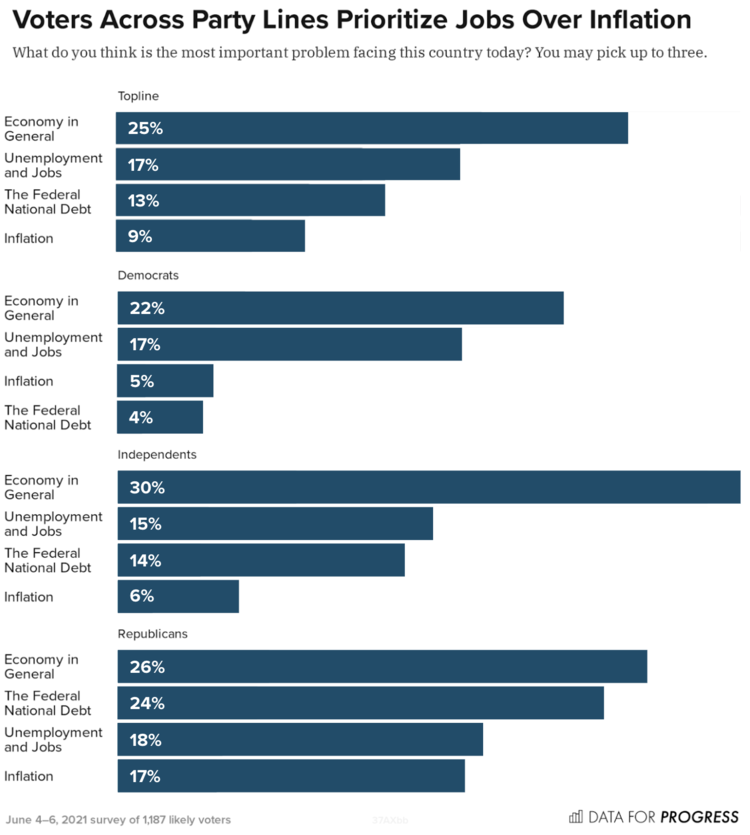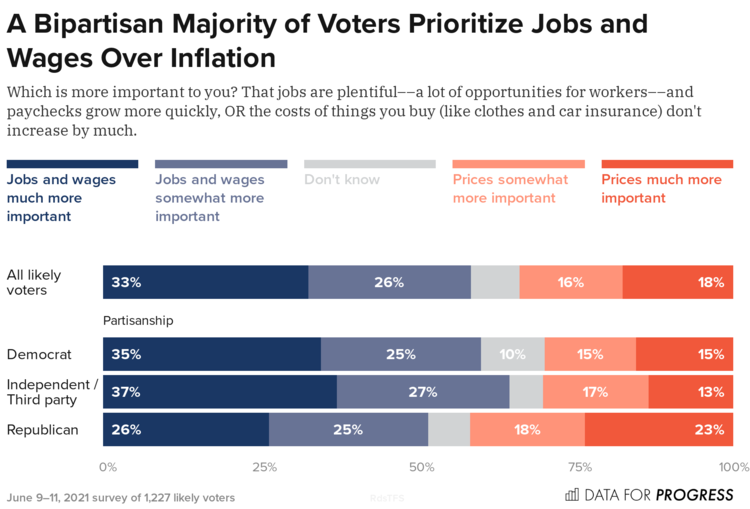While the U.S. made significant progress mitigating the health impacts of the coronavirus — new cases are down about 95 percent from their peak this January — we have far more work to do to recover from the pandemic’s economic impacts.
There are currently about 7.6 million fewer jobs than there were at the beginning of the pandemic — losses which have been most severe in low-wage industries and sectors that disproportionately employ people of color. While high-wage industries have experienced 2 percent job loss, low-wage industries have seen job losses of 8 percent.
President Biden’s American Jobs and Families Plans are urgently needed to create millions of jobs across the country and help countless families make ends meet. But the GOP has insisted that this legislation is too ambitious, arguing that we need to invest less into our economy and create fewer jobs because of inflation and the national debt. This is despite the Federal Reserve’s consistent assertion that the recent bump in inflation is transitory and should not stand in the way of efforts to boost employment.
In a June survey of 1,187 national likely voters, we tested whether voters care more about growing the economy and creating jobs or concerns over inflation and the national debt. Specifically, we presented respondents with a list of 15 issues, and asked them to select the three that they consider to be the most important problems facing the country. We find that voters care most about creating jobs and growing our economy, and place inflation and the national debt lower on their priority lists.
Among likely voters overall, 25 percent listed the economy in general and 17 percent listed unemployment and jobs as top priorities. The national debt and inflation were considered notably less important, with 13 percent and 9 percent prioritization, respectively.

Broken down by party, Democratic voters view unemployment and jobs (17 percent prioritization) as far more important than inflation (5 percent) and the national debt (4 percent). Independents share this prioritization, with 15 percent considering unemployment and jobs to be a top priority, compared with 14 percent prioritization of the national debt and 6 percent prioritization of inflation. Republicans listed the debt (24 percent) as a higher priority than unemployment and jobs (18 percent), with inflation as a lower priority (17 percent).
In a separate June survey, we also asked voters whether they find jobs and wages or maintaining low prices to be more important. We find that voters — including majorities of Independents and Republicans — strongly prioritize investing in our economy over concerns about inflation and price hikes. This includes a 30-point margin of Democrats, a 34-point margin of Independents, and a 10-point margin of Republicans.

Senate Republicans have been launching an onslaught against President Biden’s jobs package, and are actively arguing that we should create fewer jobs and allow our economy to grow significantly less because of inflation and the national debt. This argument — that we should voluntarily leave millions of families without a job, cool down our economy, and stymie wage growth that American workers desperately need — is a cruel policy choice, and our polling shows that Republicans can’t get away with it if voters are following what’s happening.
Our polling demonstrates that voters across party lines are rejecting the GOP’s narrative, and are enthusiastic about creating jobs and stimulating our economy. Democrats should feel highly confident supporting the American Jobs and Families Plans and the job and wage growth they’ll provide — and senators claiming that we can’t make these investments because of inflation and the national debt may pay the price at the polls.
Lew Blank (@LewBlank) is a senior writer at Data for Progress.
Survey Methodology:
From June 4 to 6, 2021, Data for Progress conducted a survey of 1,187 likely voters nationally using web panel respondents. The sample was weighted to be representative of likely voters by age, gender, education, race, and voting history. The survey was conducted in English. The margin of error is ±3 percentage points.
From June 9 to 11, 2021, Data for Progress conducted a survey of 1,227 likely voters nationally using web panel respondents. The sample was weighted to be representative of likely voters by age, gender, education, race, and voting history. The survey was conducted in English. The margin of error is ±3 percentage points.


Spread the word